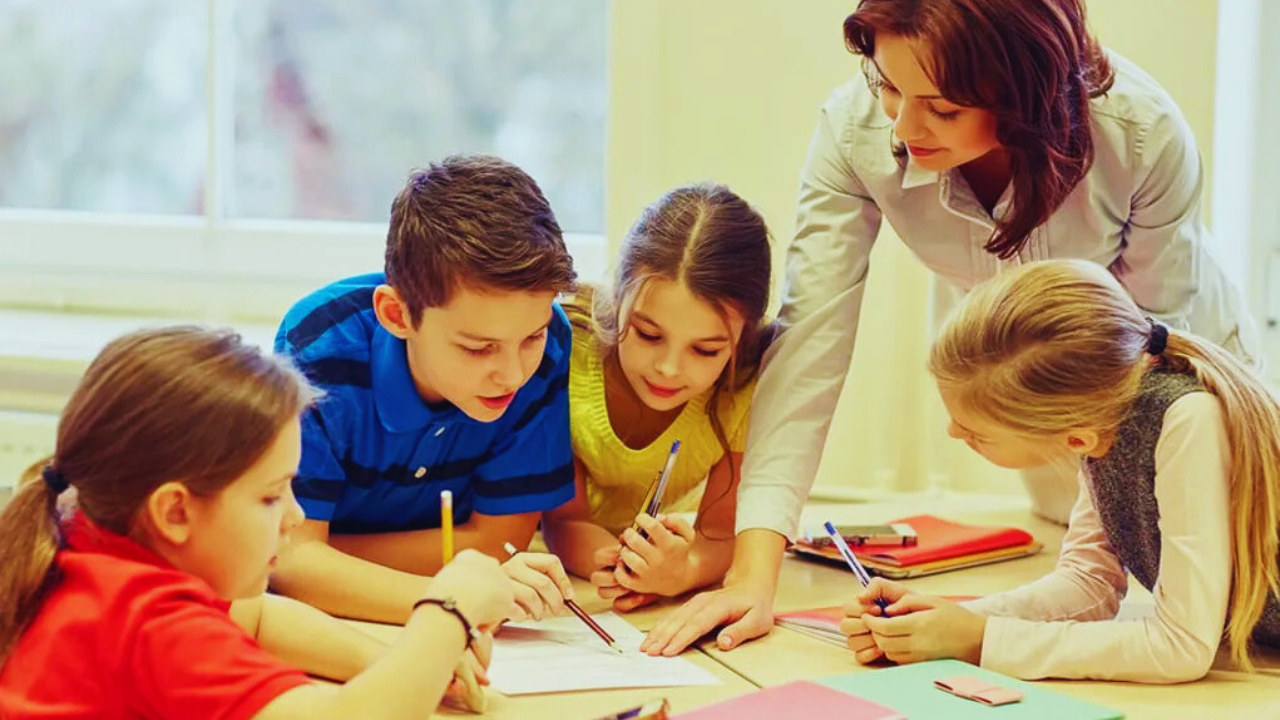Education is the process of acquiring knowledge, skills, values, and beliefs through various learning methods such as teaching, training, research, or practical experiences. It plays a crucial role in shaping individuals, communities, and nations by fostering intellectual growth, social development, and economic stability. Education empowers individuals to think critically, solve problems, and make informed decisions that contribute to personal and societal progress. It enhances communication skills, builds confidence, and promotes creativity, preparing individuals for various challenges in life. Furthermore, education fosters equality by providing opportunities for people from diverse backgrounds to improve their quality of life and achieve their aspirations. A well-educated society leads to economic growth, technological advancements, and overall development. Simple essay on education.
Education equips people with essential skills that help in securing employment and achieving financial independence. It also promotes values such as tolerance, empathy, and cooperation, leading to a harmonious and progressive society. Through education, people gain awareness of their rights and responsibilities, contributing to a just and informed citizenry. Moreover, it plays a key role in health and well-being by spreading knowledge about hygiene, nutrition, and disease prevention. Education is a powerful tool that transforms lives and paves the way for a brighter future. It enables individuals to break free from ignorance and make meaningful contributions to society. With access to education, people can develop their potential, embrace innovation, and create opportunities for themselves and others. Whether through formal schooling or lifelong learning, education remains a key driver of success and empowerment.
Types of Education
Education is broadly categorized into three types: formal, informal, and non-formal education. Each type serves different purposes and is essential for overall development.
| Type of Education | Definition | Examples |
| Formal Education | Structured learning is provided by institutions such as schools, colleges, and universities. | Classroom learning, degree programs |
| Informal Education | Unstructured learning is gained through daily experiences, social interactions, and self-study. | Reading books, learning from parents |
| Non-Formal Education | Organized learning outside the formal education system, often focused on skill development. | Online courses, vocational training |
Importance of Education

Education is vital for the growth of individuals and societies. It brings numerous advantages and contributes to the overall progress of a country. A well-educated population leads to economic stability, technological advancements, and improved living standards. Education fosters social awareness, empowering people to challenge injustices and promote equality. It also plays a crucial role in shaping responsible citizens who contribute positively to their communities. With education, people gain access to better healthcare, reducing mortality rates and enhancing overall well-being. Investing in education is investing in a nation’s future, ensuring sustainable development and long-term prosperity.
Personal Development
Education enhances critical thinking, problem-solving skills, and creativity. It enables individuals to make informed decisions, build confidence, and communicate effectively. Through education, people develop a deeper understanding of themselves and the world around them. It nurtures curiosity, encouraging lifelong learning and adaptability in a constantly changing world. Education also helps individuals cultivate discipline, resilience, and perseverance, which are essential for personal and professional growth. By equipping people with essential skills, education empowers them to pursue their passions, achieve their goals, and lead fulfilling lives.
Economic Growth
An educated workforce contributes to the economy by fostering innovation, entrepreneurship, and productivity. Higher education levels often lead to better job opportunities and financial stability. Skilled workers drive technological advancements and economic expansion, making countries more competitive in the global market. Education reduces unemployment rates by preparing individuals for diverse career paths. It also encourages self-employment, allowing people to create job opportunities for themselves and others. Additionally, educated individuals make informed financial decisions, leading to economic security and improved living conditions. A nation with a strong education system experiences sustained economic growth and reduced income inequality.
Social Benefits
Education promotes social harmony, gender equality, and cultural understanding. It reduces crime rates and encourages civic engagement by increasing awareness of rights and responsibilities. Educated individuals are more likely to support democratic values and participate in community development. Education fosters empathy, helping people appreciate diverse perspectives and build inclusive societies. It also strengthens social institutions by promoting ethical behavior and responsible leadership. Additionally, access to education empowers marginalized groups, breaking cycles of poverty and discrimination. By fostering a sense of unity and cooperation, education contributes to a more peaceful and just world.
Benefits of Education
Education offers numerous benefits that impact both personal and societal levels. Below is a table highlighting the key advantages of education:
| Benefit | Description |
| Knowledge Acquisition | Provides information and skills necessary for personal and professional growth. |
| Career Opportunities | Opens doors to various job prospects and higher income potential. |
| Improved Health | Educated individuals are more likely to adopt a healthy lifestyle and make informed healthcare decisions. |
| Empowerment | Enhances self-confidence, decision-making skills, and independence. |
| Better Society | Contributes to reduced poverty, crime, and social inequalities. |
| Innovation and Creativity | Encourages new ideas, technological advancements, and problem-solving skills. |
Challenges in Education
Despite its benefits, education faces numerous challenges that hinder its effectiveness. These challenges vary across regions and require immediate attention. Issues such as unequal access, financial constraints, outdated curricula, and a lack of resources impact students and educators alike. Addressing these challenges is crucial for ensuring inclusive and high-quality education for all.
Limited Access to Quality Education
Many children worldwide lack access to quality education due to poverty, geographical barriers, and lack of infrastructure. Rural and underprivileged areas often have insufficient schools, learning materials, and trained teachers. Gender inequality and socio-economic disparities further restrict education opportunities for marginalized groups. Conflict-affected regions also experience disruptions in schooling, limiting children’s chances for a brighter future. Without proper interventions, millions of children remain deprived of basic education, affecting their long-term development and societal progress.
High Cost of Education
The increasing cost of education makes it difficult for many students to afford higher studies, leading to financial burdens and student loans. Tuition fees, textbooks, and other expenses often put education out of reach for low-income families. Many students are forced to drop out or take on part-time jobs, affecting their academic performance. Affordable education policies and scholarships are necessary to ensure equal learning opportunities.
Outdated Curriculum
Many education systems still follow outdated curricula that do not align with modern-day requirements, leading to a skills gap in the workforce. Traditional teaching methods often focus on rote memorization rather than critical thinking and problem-solving. As industries evolve with technology, students need updated knowledge and skills to compete in the job market. Curriculum reforms, including digital literacy and vocational training, are essential to bridge this gap. Education should adapt to real-world needs to better prepare students for the future.
Lack of Skilled Teachers
A shortage of qualified and trained teachers affects the quality of education, resulting in poor academic performance among students. Many educators lack proper training, resources, or motivation due to low salaries and heavy workloads. In remote areas, schools struggle to recruit and retain experienced teachers, leaving students with limited learning support. Investing in teacher training programs and improving working conditions can enhance the overall education system. Skilled teachers play a crucial role in shaping the minds of future generations.
Technology Integration
Simple essay on education, While technology can enhance learning, not all students have access to digital devices or the internet, creating a digital divide in education. Many low-income families and rural schools lack the infrastructure needed for online learning. The rapid shift to digital education during crises, such as the COVID-19 pandemic, further exposed these inequalities. To bridge the gap, governments and organizations must invest in affordable internet access, digital literacy programs, and technological resources for students. Technology should be an enabler, not a barrier, in education.
Role of Technology in Education
Technology has revolutionized education by making learning more interactive, accessible, and efficient. It has transformed traditional teaching methods and created new opportunities for students and teachers alike.
| Technology | Impact on Education |
| E-Learning Platforms | Provides access to online courses, tutorials, and educational resources. |
| Smart Classrooms | Enhances learning through digital tools like projectors and interactive whiteboards. |
| Artificial Intelligence | Personalizes learning experiences and offers data-driven insights for better teaching methods. |
| Virtual Reality (VR) | Creates immersive learning experiences, especially in fields like medicine and engineering. |
| Mobile Learning | Enables students to learn anytime, anywhere through mobile applications. |
Wrapping Up
Education is the foundation of progress and development in every aspect of life. It provides individuals with the knowledge, skills, and values necessary to navigate challenges and contribute meaningfully to society. Education fosters critical thinking, creativity, and problem-solving abilities, empowering people to make informed decisions. It also promotes ethical behavior, social responsibility, and cultural awareness, leading to a more inclusive and tolerant society. A well-educated population drives innovation, economic stability, and technological advancements, ensuring long-term growth.
Moreover, education reduces inequalities by offering equal opportunities to people from all backgrounds. It enhances health awareness, improves living standards, and paves the way for a sustainable future. Therefore, investing in education is not just about personal success but about creating a progressive, knowledgeable, and prosperous world.
FAQs
Why is education important for a better future?
Education provides individuals with the necessary skills and knowledge to achieve success in life. It opens up better job opportunities, enhances personal growth, and improves decision-making abilities. Educated individuals contribute positively to society, making communities more progressive and stable. Furthermore, education fosters innovation and critical thinking, helping nations develop economically and socially.
How does education help in reducing poverty?
Education equips individuals with skills and knowledge that enable them to secure better-paying jobs and improve their living standards. Higher literacy rates lead to increased employment opportunities, reducing economic disparities. Additionally, education encourages entrepreneurship and innovation, which contribute to economic growth. By empowering individuals with knowledge, education breaks the cycle of poverty and promotes self-sufficiency.
What are the challenges faced by students in education?
Students encounter various challenges, such as financial difficulties, lack of access to quality education, outdated curricula, and insufficient learning resources. Additionally, high competition, stress, and mental health issues affect academic performance. In remote areas, inadequate school infrastructure and unavailability of qualified teachers further hinder learning opportunities for students.
How does technology impact modern education?
Simple essay on education, Technology has revolutionized education by introducing digital classrooms, online learning platforms, and interactive teaching tools. It enhances accessibility, making education available to students worldwide. AI-driven learning systems personalize education, catering to individual needs. However, the digital divide remains a challenge, as not all students have equal access to technological resources.
How do parents contribute to their child’s education?
Simple essay on education, Parents play a crucial role in shaping their child’s education by providing guidance, motivation, and support. Encouraging a learning-friendly environment at home, monitoring academic progress, and fostering good study habits contribute to a child’s success. Active parental involvement in school activities and communication with teachers also enhances a child’s educational experience and performance.
How can education promote social harmony?
Education fosters understanding, tolerance, and respect among individuals from diverse backgrounds. It reduces discrimination and promotes equality by teaching ethical values, cultural appreciation, and conflict-resolution skills. Educated societies tend to have lower crime rates and improved social relationships, leading to peaceful coexistence and national development.
What are the benefits of lifelong learning?
Simple essay on education, Lifelong learning enables individuals to stay updated with new skills, knowledge, and trends throughout their lives. It enhances career growth, personal development, and adaptability to changing environments. Continuous learning improves problem-solving abilities, boosts confidence, and keeps the mind active, leading to overall well-being and professional success.

